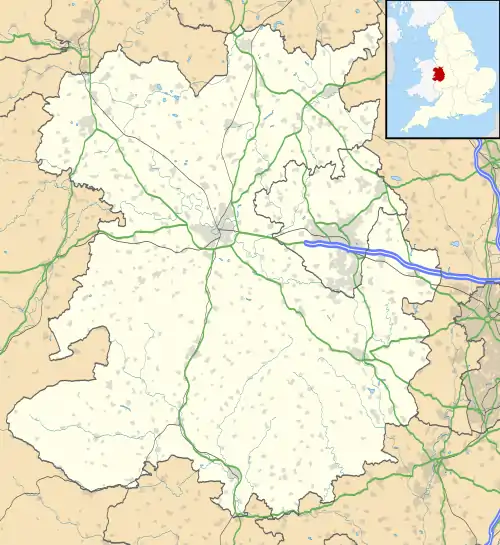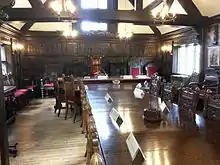Much Wenlock Guildhall
The Much Wenlock Guildhall is a guildhall located on Wilmore Street in Much Wenlock, Shropshire. It is a Grade II* listed building.[1]
| Much Wenlock Guildhall | |
|---|---|
 | |
| Location | Much Wenlock, Shropshire |
| Coordinates | 52.59603°N 2.55719°W |
| Built | 1557 |
Listed Building – Grade II* | |
| Designated | 24 October 1950 |
| Reference no. | 1053794 |
 Location of Much Wenlock Guildhall in Shropshire | |
History

In the aftermath of the dissolution of the monasteries, which saw the powers of Wenlock Priory suppressed, civic leaders sought a new meeting place to conduct the business of the town.[2] The new half-timbered building which they commissioned was completed in two phases, the south end (the court room) in 1540 and the north end (the council chamber) in 1557.[2]
The design for the main frontage on Wilmore Street featured three large gables.[2] On the ground floor, at the north end there was initially a prison (it was dismantled in 1869), in the central section there was arcading to allow markets to he held[3] and at the southern end there was a passageway for carriages to pass through.[1] At first floor level, the design involved tall mullion windows below each of the three gables.[1] A new cupola was erected on the roof in 1720.[2]
Internally, the principal rooms are the courtroom and the council chamber, both on the first floor.[2] The courtroom was the venue for the Quarter sessions where the more serious offences were considered, and also the venue for the Petty sessions where more trivial offences were considered.[2] The Royal Coat of Arms, which is that of Queen Elizabeth I, was erected in the courtroom in 1589.[4] An "inner room" for the storage of court records was created in 1616.[2] The last quarter sessions were held in the courtroom in 1951 and the last petty sessions, by then known as magistrates' courts, were held there in 1985.[2]
The council chamber was the meeting place of the municipal borough of Much Wenlock which was incorporated under the Municipal Corporations Act 1835; it was fitted out with ornate Jacobean style panelling which had been retrieved from a local country house and installed at the expense of the educationalist, William Penny Brookes in 1848.[2][lower-alpha 1] The council chamber ceased to be the local seat of government when Much Wenlock was absorbed into the Bridgnorth Rural District in 1966.[8][9] However, it still remains the meeting place of the local town council.[10]
The principal rooms are open to visitors (after the payment of a fee) from April to October.[11] The stocks and the whipping post can both be seen on the ground floor.[2]
Notes
- Brookes also provided the inspiration for the Wenlock Olympian Games, a forerunner of the modern Olympic Games.[5][6][7]
References
- Historic England. "Guildhall, Much Wenlock (1053794)". National Heritage List for England. Retrieved 26 August 2019.
- "Much Wenlock Guildhall". Much Wenlock Town Council. Retrieved 21 August 2020.
- "Markets". Much Wenlock Town Council. Retrieved 21 August 2020.
- "Much Wenlock Guildhall". Britain Express. Retrieved 21 August 2020.
- "Beautiful Shropshire town that was a trailblazer for the Olympics". Manchester Evening News. 10 January 2013. Retrieved 21 August 2020.
- "William Penny Brookes". Wenlock Olympian Society. Retrieved 21 August 2020.
- "Where England's Olympic history began". Wandering Educators. Retrieved 21 August 2020.
- Baggs, A P; Baugh, G C; Cox, D C; McFall, Jessie; Stamper, P A (1998). "The Liberty and Borough of Wenlock". Victoria County History. A History of the County of Shropshire: Volume 10, Munslow Hundred (Part), the Liberty and Borough of Wenlock. pp. 187–212. Retrieved 21 August 2020.
- Great Britain Historical GIS / University of Portsmouth, Much Wenlock CP/AP. Retrieved 21 August 2020.
- "Ten town halls to visit". The Telegraph. 29 November 2008. Retrieved 21 August 2020.
- "Much Wenlock Guildhall". Visit Much Wenlock. Retrieved 21 August 2020.